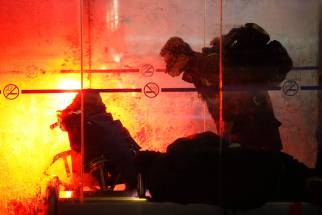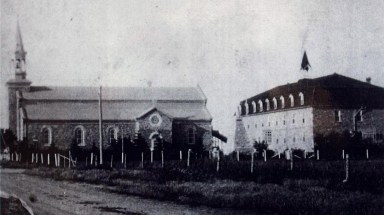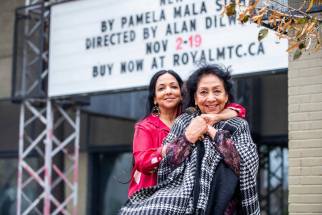No denying genocide intent of residential school system
Read this article for free:
or
Already have an account? Log in here »
To continue reading, please subscribe:
Monthly Digital Subscription
$0 for the first 4 weeks*
- Enjoy unlimited reading on winnipegfreepress.com
- Read the E-Edition, our digital replica newspaper
- Access News Break, our award-winning app
- Play interactive puzzles
*No charge for 4 weeks then price increases to the regular rate of $19.00 plus GST every four weeks. Offer available to new and qualified returning subscribers only. Cancel any time.
Monthly Digital Subscription
$4.75/week*
- Enjoy unlimited reading on winnipegfreepress.com
- Read the E-Edition, our digital replica newspaper
- Access News Break, our award-winning app
- Play interactive puzzles
*Billed as $19 plus GST every four weeks. Cancel any time.
To continue reading, please subscribe:
Add Free Press access to your Brandon Sun subscription for only an additional
$1 for the first 4 weeks*
*Your next subscription payment will increase by $1.00 and you will be charged $16.99 plus GST for four weeks. After four weeks, your payment will increase to $23.99 plus GST every four weeks.
Read unlimited articles for free today:
or
Already have an account? Log in here »
Hey there, time traveller!
This article was published 01/11/2022 (1139 days ago), so information in it may no longer be current.
It’s becoming increasing difficult for residential school denialists to defend their cause. The latest blow: a unanimous resolution by the House of Commons last week that calls on the government to recognize what happened to Indigenous children at residential schools as genocide.
The motion was introduced by NDP MP Leah Gazan. It was the Winnipeg Centre representative’s second attempt to convince her parliamentary colleagues to come to grips with Canada’s true past. A similar motion last year failed.
As Canadians learn more about how their country conspired with organized religion to eradicate Indigenous people through assimilative and other policies, the term genocide can no longer be dismissed. Pope Francis, who issued a formal apology during his visit to Canada in July for the Catholic Church’s involvement in residential schools, acknowledged it was genocide.
The House of Commons resolution, although not binding on government, was significant. The fact it received all-party support, including from the Conservative Party of Canada (hardly considered “woke” members of Parliament) is indicative of the public’s growing awareness of Canada’s genocidal policies against Indigenous people.
SEAN KILPATRICK / CANADIAN PRESS FILES It was Leah Gazan's second attempt to convince her parliamentary colleagues to come to grips with Canada’s true past. A similar motion last year failed.
There is incontrovertible historical evidence the goal was to eliminate them as a people.
It’s precisely what Sir John A. Macdonald, Canada’s first prime minster, referred to when he said educating Indigenous children without ridding them of their language, culture and way of life was pointless. It’s why, he argued, they needed to be sent far away from their communities to undergo transformation.
“When the school is on the reserve, the child lives with its parents, who are savages,” Macdonald told the House of Commons in 1883. “He is surrounded by savages, and though he may learn to read and write, his habits, and training and mode of thought are Indian. He is simply a savage who can read and write.”
The objective was not to educate, it was to destroy a people by (among other tactics) sending their children to residential schools and beating the “Indian” out of them. They were malnourished, forced to live in unclean and unsafe buildings, abused sexually, physically and psychologically, subject to child labour, and sometimes buried in makeshift, unmarked graves without parents’ knowledge.
If that isn’t genocide, what is?
There is incontrovertible historical evidence the goal was to eliminate them as a people.
Where does all this leave the residential school deniers, who continue to claim Canada’s only motive was to provide Indigenous children with an education? In an increasingly lonely spot.
Not surprisingly, there’s been renewed pushback against the use of the word genocide to describe residential schools.
Trent University historian Christopher Dummitt argued in a National Post column last week that while atrocities did occur at residential schools, they did not amount to genocide because there was no intention to destroy them as a people. He cites a piece written last year by Canadian historian and author J.R. Miller, who made a similar argument.
Interestingly, in Miller’s 1996 book Shingwauk’s Vision: a History of Native Residential Schools, the author makes the opposite argument.
Quoting the 1948 writings of an official from the U.S. Bureau of Indian Affairs, Miller concludes: “Clearly, Canada chose to eliminate Indians by assimilating them, unlike Americans, who had long sought to exterminate them physically.”
Miller goes on to reference the U.S. official and remarks: “By the cultural assimilation it would bring about, education in residential schools would prove ‘the means of wiping out the whole Indian establishment.’”
Canada can’t move forward without fully recognizing its past and how it affects today’s social order, including the systemic racism that still pervades society.
“Chose to eliminate” and “wiping out the whole Indian establishment” sounds an awful lot like genocide.
Why is all this important? Because Canada can’t move forward without fully recognizing its past and how it affects today’s social order, including the systemic racism that still pervades society.
Non-Indigenous Canadians benefited from colonialism and continue to do so through generations of privilege. That came at the expense of Indigenous people.
Listening, learning and acting is the only way Canada can transform itself into a more equitable society. The unanimous consent of the House of Commons to accept Canada’s true history is a promising step towards achieving that goal.
Hopefully, the denialists are paying attention.
tom.brodbeck@freepress.mb.ca

Tom has been covering Manitoba politics since the early 1990s and joined the Winnipeg Free Press news team in 2019.
Our newsroom depends on a growing audience of readers to power our journalism. If you are not a paid reader, please consider becoming a subscriber.
Our newsroom depends on its audience of readers to power our journalism. Thank you for your support.







